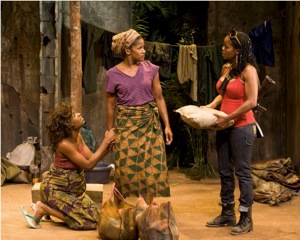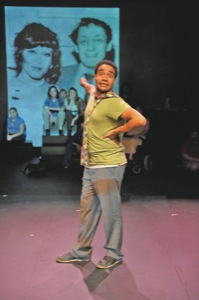Theater
Of war and politics
Published Thursday, 01-Oct-2009 in issue 1136
‘Eclipsed’
“When two elephants fight, it is the grass that suffers.” – African proverb
They say what doesn’t kill you makes you strong.
During the civil war in Liberia at the end of the 20th century, many girls became captive “wives” of officer combatants (rape established the “wife” designation). Many were abducted in their early teens and held until the end of the war, which lasted almost 14 years. Some captives escaped by taking up arms and becoming soldiers themselves.
Danai Gurira’s Eclipsed shows the effects of that war on four “wives” of a rebel commander they call “the CO.” Known by number, the wives share a dilapidated and bullet-scarred hovel in a Liberian jungle outpost, where they perform housework and remain at the sexual beck and call of the unseen CO. Eclipsed plays through Sunday, Oct. 18, at the Kirk Douglas Theatre in Culver City. Robert O’Hara directs.
Number One (Bahni Turpin), the oldest (perhaps 25) and no longer desired for sex, is the cook. Her seniority gives her certain privileges - first choice of any spoils of war the CO may bring and the authority to boss the other “wives” around.
Number Three (Edwina Findley), about 19, is pregnant by the CO and is most concerned about being the youngest and prettiest.
The drama centers around The Girl (Miriam F. Glover), who appeared one night while fleeing the war and is being protected by Number One. Because her presence is unknown to the CO, she hides under a large metal laundry tub when he is near.
The Girl is different from the others - she has a little education and is able to read (albeit haltingly); she provides entertainment by reading a battered biography of Bill Clinton the CO had given to Number One.
It’s a grim existence - food supplies are meager, escape nearly impossible, male company degrading, but withal they persevere, arguing, joking, listening to The Girl read, consoling each other and dreaming of the end of the hostilities.
But it’s Number Two (Kelly M. Jenrette) who has upset the domesticity of the group. She has escaped captivity, taking an AK-47 and her destiny into her own hands by joining the fighting forces. Number One considers her a devil and can barely speak of her. When Number Two returns in search of new recruits, The Girl must decide which way to go.
Into the mix comes a visitor – Rita (Michael Hyatt), representative of a women’s peace group, who tries to show the wives (and the CO) another way.
It’s the woman warrior who inspired the play. In her research, Gurira ran across a photo of 22-year-old “Black Diamond” in tight jeans, slinky top and beret, hoisting an AK-47 and looking at the camera with a stony stare. Gurira wanted to know her story.
This is a fine cast and a terrific production, helped immeasurably by O’Hara’s fine direction and Sibyl Wickersheimer’s excellent revolving set, which nearly surrounds the hut with jungle vegetation. The one drawback is the dialect these women speak, which is sometimes difficult to understand.
Gurira, who won an Obie for In the Continuum, is opening Eclipsed simultaneously in Washington, D.C., at the Yale Repertory Theatre and in Los Angeles.
But though the background is war, Eclipsed is neither political screed nor anti-war tract - Gurira wisely concentrates on the women’s stories and their reality, hopes and aspirations. It is a powerful and strangely positive depiction of survival under dismal conditions.
Eclipsed plays through Sunday, Oct. 18, at the Kirk Douglas Theatre in Culver City. Shows Tuesday through Friday at 8 p.m.; Saturday at 2 and 8 p.m.; Sunday at 1 and 6:30 p.m. For tickets, call 213-628-2772 or visit www.CenterTheatreGroup.org.
‘Things We Want’
To hear Jonathan Marc Sherman tell it, you’d think there was a second “lost generation,” this one paralyzed by inaction and hooked on alcohol and/or assorted drugs.
Sherman should know. Orphaned by his mother’s suicide at age six, Sherman went on to become a theatrical wunderkind at 18 with the production of Wallace and Women. But that was followed by his own dark night of the soul, an alcoholic phase that lasted about a decade.
Sherman paints that world in Things We Want, giving us three brothers in their 20s and 30s, still living in the family apartment dominated by the huge bay window from which their parents leapt to their deaths ten years apart. All show signs of arrested development; each has his own coping mechanism.
In Act 1, middle brother Sty (Adam Brick) is on the couch in an alcoholic stupor. Older brother Teddy (Joshua Everett Johnson) has latched onto new-age guru Dr. Miracle for support, and has worked for him for about ten years.
Youngest brother Charlie (Tim Parker) is addicted to love. He arrives to announce that he has just dropped out of culinary school because of a “heart breakdown” (girlfriend Zelda dumped him), which has led him to the conclusion that nothing matters.
Sty introduces the plot’s catalyst – neighbor and recovering alcoholic Stella (Rachael VanWormer), sexy in the old short-skirted school uniform she wears every birthday.
Act 2 takes place a year later and brings major plot reversals: Teddy, disillusioned by the exposure of Dr. Miracle as a scam artist, is now on the couch, busily drinking himself to death, while Sty is celebrating a year of sobriety and Charlie is about to prepare an anniversary dinner for Stella.
Sherman has a good ear and a way with engaging dialogue, but though amusing to watch, these sudden changes stretch credulity too much to inspire audience empathy, especially when Stella volunteers to stay with the dead-drunk Teddy while Sty leaves and Charlie goes shopping for dinner.
Director Lisa Berger has said she likes dark plays. So do I, but I’m less enamored of muddy ones. Despite a sterling cast – Johnson, perfect as the buttoned-down pedant Teddy; Parker wonderfully puppy dog-like; Brick a rather endearing but suddenly reformed drunk; VanWormer a very strong Stella – I left Things We Want wondering what it was all about, and why I should care about these characters.
That said, if the walking wounded interest you, this is probably as good a production as you’ll see.
Things We Want plays through Sunday, Oct. 11, at New Village Arts Theatre. Shows Thursday through Saturday at 8 p.m.; matinees Saturday at 3 and Sunday at 2 p.m. For tickets, call 760-433-3245 or visit www.newvillagearts.org.
‘Dear Harvey’
The groundbreaking work of gay activist Harvey Milk went unheralded and nearly unnoticed by any but Californians until two recent Oscar-winning films made his name a household word: Rob Epstein’s 1984 documentary The Times of Harvey Milk and Gus Van Sant’s 2008 Milk.
Now local playwright Patricia Loughrey brings Milk and his legacy to life onstage in Dear Harvey, playing through Friday, Oct. 2, at SDSU’s Experimental Theatre. Commissioned by Dan Kirsch, artistic director of Diversionary Theatre, Dear Harvey was presented there earlier this year.
Dear Harvey has elements of documentary, memoir, tribute and dramatization, but mostly it’s a celebration of his life and work, accompanied on the piano by SDSU student Thomas Hodges, playing his own score.
For many gays, the opening lines “I came out at 14 and never felt at home again” have a familiar ring. Harvey was luckier as a kid because he played basketball and football and no one knew. Even as an adult, he lived a relatively content closeted life until the signal event that inspired his activism: he was fired from his job in finance for refusing to cut his hippie-length hair. Harvey burned his Bankamericard and moved to the Castro with new boyfriend Scott Smith, where they opened Castro Camera and became known as fixers of problems.
It took him four tries to get elected, but finally he won a seat on the San Francisco Board of Supervisors and was in a position to break new equality ground when fellow Supervisor Dan White gunned him and Mayor Moscone down 11 months after he took office.
Dear Harvey is anchored by Anthony Simone’s sparkling portrayal of local drag queen Nicole Murray-Ramirez and Derek Smith’s solid interpretation of Cleve Jones, who would spearhead the making of the AIDS quilt.
Courtney Howard is also fine as Mary Stockton, whose inability to get the words “I am lesbian” out of her mouth is both amusing and poignant. And Emily Davenport is terrific as Anne Kronenberg, the clueless youngster who learned enough about politics from Milk to run his successful campaign.
Director Peter James Cirino choreographs this episodic piece well, so that it moves well and smoothly integrates Dominic Abbenante’s projection design.
The struggle for equality is not over, but Milk inspired the movement to keep going and never take no for an answer. Dear Harvey shows you how he accomplished that.
Dear Harvey plays through Friday, Oct. 2. Shows Wednesday through Friday at 8 p.m. For tickets, call 619-594-6884 or visit www.theatre.sdsu.edu.
|
|
Copyright © 2003-2025 Uptown Publications



